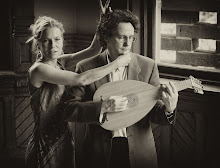


Flow my teares fall from your springs - John Dowland (1563-1626)
If fluds of teares could cleanse my follies past
I saw my Lady weepe
Merry Melancholie - Thomas Robinson (fl. c 1600)
Semper Dowland Semper Dolens
Now cease my wandring eies
Mourne, mourne, day is with darknesse fled
Lachrimae Pavan
A Shepeard in a shade, his plaining made
Times eldest sonne, olde age the heyre of ease
Dye not before thy day, poore man condemned
Intermission
Melancholly Galliard
Cleare or cloudie sweet as Aprill showring
O sweet woods the delight of solitarinesse
Dump Philli - Anon.
Sorrow stay, lend true repentant teares
Please restrain any applause till intermission and the end of the concert.
David Klausner was a founding member of the Toronto Consort, with whom he played for twenty years, specializing in early wind instruments. Since his retirement from the Consort he has appeared regularly as a bassoonist with orchestras in the Toronto area. For the past thirty years he has taught regularly at early music summer schools in Canada, Europe, and the United States. In his other life he is Professor of English and Medieval Studies, and Vice-Dean for Interdisciplinary Affairs in the Faculty of Arts & Science, University of Toronto. His areas of research include the documentary history of early drama in England and the social history of music.
Hallie Fishel, soprano, takes particular interest in the poetry and the historical pronunciation of the texts she sings, and enjoys lecturing on these topics, as well as other aspects of performance practice and the role of music in early modern culture, at colleges and universities across North America. She studied both traditional operatic technique and early music at Indiana University, with Thomas Binkley, Margaret Harshaw and Paul Elliott, and at the Longy School of School of Music with Laurie Monahan. With Musicians in Ordinary, she has also been heard playing the rebec, lira da braccio, and a little guitar. Hallie teaches voice privately and acts as a consultant to both singers and public speakers on matters of vocal health. She has served as soprano soloist at the Church of the Redeemer, Toronto, and as Director of Music at Trinity Anglican Church, Port Credit.
John Edwards specializes in playing numerous historical plucked string instruments, from the medieval lute to the theorbo to the nineteenth century guitar. Though he plays continuo lutes with orchestras, Mr. Edwards has always had a love of song and is in high demand as an accompanist and coach. Recently graduated as an M.A. from York University, he is a Fellow of the Centre for Reformation and Renaissance Studies at the University of Toronto and has given lectures and demonstrations throughout North America.
An Anatomy of Melancholy
From the last years of Elizabeth’s reign through James’s melancholy and its attendants became a theme, even an obsession with artists. Few Shakespeare plays are without at least one character who exhibits symptoms of this disease. There were plenty of macro reasons to feel melancholy; high unemployment, inflation, a government in debt and a parliament paralyzed. Poets and musicians, though, tend to focus on the micro causes of black bile, or melancholia, to give it its Greek name.
Lucy, Countess of Bedford cultivated an image of herself as the light (‘Lucy’) in the darkness for many artists working with the imagery of melancholy. John Donne, Samuel Danyel and John Dowland were all her creatures. Dowland’s Second Book of Songs was dedicated to Lucy, and it is from this book that all of the songs heard this evening are taken. Dowland compiled the book while working for the King of Denmark, and it seems tailored to cash in on the vogue for melancholy as well as reminding the reader of a society retirement party he wrote the music for (Times eldest sonne), and allying the composer with the ill-fated Earl of Essex (The text of O sweet woods is probably a plaint by Essex to Elizabeth). It also features a song with an amorous shepherd whining on a riverbank, because Dowland knew that pastoral verse was ‘as you like it.’ Dowland, like Lucy, seems to have been cultivating an image he being ‘semper dolens’, ever sad.
Robert Burton, Oxford scholar, wrote only one book in his life, though he revised and expanded it for nearly a quarter of a century from its publication in 1621. One of his aim seems to have been to collect all the information about the melancholy disease, though his stated aim is more personal. ‘I write of melancholy, by being busy to avoid melancholy.’ His straggly life’s work is a mass of quotations from the ancients and ‘neoterics’ frequently digressing into such subjects as the nature of air, spirits, and in the Third Partition, love. His treatise of love melancholy and its causes very often strays from the ‘scientific’ purposes of the book to the edges of poetry. We will leave the last word to Burton:
But to leave all declamatory speeches in praise of divine music, I will confine myself to my proper subject: besides that excellent power it hath to expel many other diseases, it is a sovereign remedy against despair and melancholy, and will drive away the devil himself.

